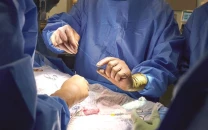Mufti Muneeb, Dr Banuri agree to resolve degree issue of madrassas
Joint committee to roll out solution for equivalence after end of two-year BA, MA programmes

Representational Image. PHOTO: FILE
This was decided in a meeting of representatives of madrassas and HEC Chairman Dr Tariq Banuri on Tuesday.
The joint committee will assess how the equivalence system could be adapted to the changes made in degree awarding system.
A delegation comprising representatives of different boards of madrassas, led by Tanzeemul Madaris Ahle Sunnat President Mufti Muneebur Rahman, Maulana Haneef Jallandhry, Maulana Abdul Malik, Dr Attaur Rahman and Allama Afzal Haidri called on HEC Chairman Dr Banuri.
The meeting discussed the implications for madrasah graduates of the closure of two-year BA and BSc and MA and MSc programmes.
The madrassas give degree of Arabic and Islamic learning known as Shahadatul Alia fil Uloomal Arabia Wal Islamia and Shahadatul Almiya fil Uloomal Arabia Wal Islamia.
Associate Degree to replace two-year BA, BSc, announces HEC
HEC considers Shahadatul Alia equivalent to two-year BA/BSc and Shahadatul Almiya to two year MA/MSc.
However, HEC has now discontinued the certification of BA and MA degrees. Instead, a new four-year BS degree as well as a two-year Associate Degree has been introduced.
The objective of the change is to ensure that graduates from Pakistani universities possess three types of competencies, namely general education, subject specialization, and practical skills for participating effectively in the economy.
These competencies are just as relevant for madrasah graduates as for university graduates.
Mufti Muneebur Rehman appreciated HEC for strengthening the graduate programme and making much-needed changes. He said that the representatives of the madrassas were fully supportive of the central role of HEC in strengthening higher education, especially after the 18th Amendment. He also said that he and his colleagues wish to make sure that the recent changes in HEC policies do not affect the future of madrasah students adversely.
HEC chairman appreciated the delegates for anticipating future changes, and agreed to set up a joint committee with the representatives of madaaris to assess how the equivalence system could be adapted to the changes.
Mufti Muneeb thanked the chairman for considering their request and for his resolve to improve and streamline the higher education sector of the country.
Published in The Express Tribune, July 17th, 2019.



















COMMENTS
Comments are moderated and generally will be posted if they are on-topic and not abusive.
For more information, please see our Comments FAQ